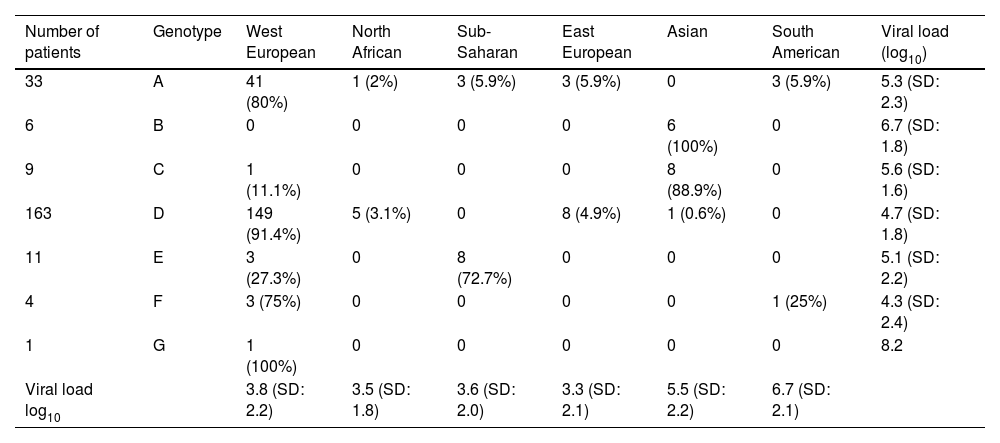To identify risk factors associated with the development of hepatocellular carcinoma (HCC) in an unselected cohort of patients with chronic B virus infection (CHB) in Spain. A predictive model was developed to assess the risk of HCC.
Material and methodsA prospective open-cohort study recruited 446 unselected patients with chronic hepatitis B infection from two hospitals in Málaga (Spain). The follow-up time ranged from 0.5 to 31.5 years (mean: 13.8; SD: 9.5; median: 11.4 years). We used a Cox proportional hazard model to estimate the multivariable-adjusted hazard ratios of risk factors associated with the development of liver cancer and developed a clinical score, (HCCB score) to determine the risk of liver cancer, that categories patients into two risk levels for the development of HCC. We compared the diagnostic accuracy of our model with other previously published.
ResultsDuring the follow-up period, 4.80% of the patients developed liver cancer (21 out of 437), 0.33 cases per 100 patient-years. Multivariate Cox regression analysis revealed that age >45 years, male gender, hepatitis C coinfection, alkaline phosphatase >147IU/L, Child score >5 points, glucose >126mg/dL, and a viral load >4.3 log10 IU/mL were independent risk factors. A risk score has been developed with a high predictive capacity for identifying patients at high risk of developing hepatocellular carcinoma. AUROC 0.87 (95% CI: 0.79–0.95).
ConclusionsAn HCCB score greater than 5.42 points identifies a subgroup of chronic hepatitis B patients at high risk of developing liver cancer, who could benefit from screening measures for the early diagnosis of HCC.
Identificar loa factores de riesgo asociados al desarrollo de carcinoma hepatocelular (CHC) en una cohorte no seleccionada de pacientes con infección crónica por virus de la hepatitis B en España. Desarrollo de un modelo predictivo para evaluar el riesgo de desarrollo de hepatocarcinoma.
Materiales y métodosSe trata de un estudio prospectivo de cohortes abiertas donde se reclutó a 446 pacientes no seleccionados con infección crónica por hepatitis B en 2 hospitales de Málaga (España). El tiempo de seguimiento osciló entre 0,5 y 31,5 años (media: 13,8; DE: 9,5; mediana: 11,4 años). Utilizamos un modelo de riesgos proporcionales de Cox para estimar los cocientes de riesgos ajustados para múltiples variables de los factores de riesgo asociados con el desarrollo de cáncer hepático y desarrollamos un score clínico (HCCB) para determinar el riesgo de desarrollo de hepatocarcinoma, que clasifica a los pacientes en 2 niveles de riesgo para su desarrollo. Comparamos la precisión diagnóstica de nuestro modelo con otros publicados previamente.
ResultadosDurante el seguimiento, el 4,80% de los pacientes desarrollaron hepatocarcinoma (21 de 437); 0,33 casos por 100 pacientes/año. El análisis multivariante de regresión de Cox reveló que la edad >45 años, el sexo masculino, la coinfección por hepatitis C, la fosfatasa alcalina >147UI/l, la puntuación Child >5 puntos, la glucosa >126mg/dl y una carga viral >4,3Log10UI/ml eran factores de riesgo independientes. Desarrollamos un score con una alta capacidad predictiva para identificar a los pacientes con alto riesgo de desarrollar CHC. AUROC: 0,87; IC 95%: 0,79-0,95.
ConclusionesUna puntuación HCCB superior a 5,42 puntos identifica a un subgrupo de pacientes con hepatitis B crónica con alto riesgo de desarrollar CHC, que podrían beneficiarse de medidas de cribado para el diagnóstico precoz del mismo.












